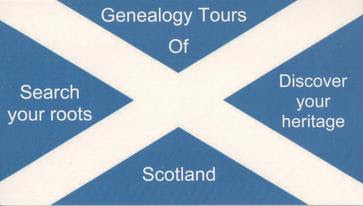In order to be successful researching your Scottish ancestors, you need to know where in Scotland
The first line of attack in trying to locate the geographic location of your Scottish ancestors is FamilySearch https://familysearch.org/ FamilySearch is free. You can start by researching genealogies already submitted at: https://familysearch.org/family-treesPlease remember that you still need to check the actual records and documents for yourself to make sure that you are researching the correct family.
Another great way to find others researching YOUR ancestors and who might be able to fill in the place for you is through GenesReunited: http://www.genesreunited.co.uk/Once you upload your Gedcom, you will get an email every week or two alerting you to others who are researching the same people you are. The connections you make will be distant family members. The subscription for the year is £20 ($34 cdn/$26usd) for the basic membership (that's all you really need!).
Once you know what part of Scotland
This is a pay-per-view site, so be prepared. You can purchase 30 credits for £7.50 ($12.75cdn/$9.70usd). It is free to see the results in the index. It is 6 credits to view the image of the record. Credits are good for one year from the date of purchase.
Civil Registration in Scotland
OPR Baptisms: At times you will get the names of both parents. However, you are more likely to get only the father's name, the date and parish of the baptism, and the name of the witnesses.
OPR Marriages: The OPRs document what was known as the “Crying of the Banns". The intention of the couple to marry was announced from the pulpit for three successive Sundays prior to the marriage. This was standard practice in the Church of Scotland. The Banns were generally proclaimed in the parish church of each partner. This is important to note as sometimes you will find two dates and two parishes for a couple. This does not mean they were married twice, it simply means that the banns were proclaimed in each parish. Just remember this is the intention to marry. It is not a guarantee that the couple went through with the marriage.
OPR Burials: Rather than death records, you will get burial records or the statement about the rental of a “mortcloth” for the dressing of the coffin. This is often included in the financial records of the parish.
Post 1855, civil records are available. These contain a great deal of detail and are a wealth of genealogical information for anyone researching Scottish ancestors.
Birth records: On the birth records, you will find the maiden name of the mother ( "M.S." means 'maiden surname'), the date and place of marriage for the parents of the new baby, place and time of the baby's birth.
Marriage Records: On the marriage record, you will find the names for each partner’s parents, the occupation of each partner and the occupation for each partner's father. Accessing marriage records always gets you one generation back by providing the information on the couple's parents. The maiden name of each mother of the couple will also be listed on the marriage register for the couple getting married.
Death Records: The death records will list the name of the deceased. Also on the death record will be the name of the spouse. If the person was a female, her maiden name will be listed along with her married name. If there are any previous spouses of the deceased, their names will also be listed.
Census Records will give you not only the name of your ancestor, but the people in their household as well. You will find the name of the head of the household, usually the father/husband unless he is deceased. If the husband was deceased, his wife will be listed as the head. All children residing in the home will also be listed along with their ages. Remember that it was not uncommon for children as young as 13 to be away at work. The census records "everyone present in the house on the night" so anyone visiting, working etc would not be included.
Catholic Parish Registers are available on the ScotlandsPeople website and comprise records of:
In addition, on the ScotlandsPeople website, you will find Wills and Testaments from 1500 - 1925. The images of wills are 10 credits to view.
Soldiers wills can be found on the ScotlandsPeople website as well. These are primarily from fallen soldiers of the first world war but there are some from the Korean War, the Boer War and the Second World War wars as well. The wills contain the battalion, regiment rank and service number for the soldier, as well as the person they named as their beneficiary. These wills were in the soldier's own handwriting.
Valuation Rolls are, essentially, property assessment rolls. The value in these records is finding out who owned the building your ancestor lived in. Often this was their employer - coal mine, iron works, printworks, farmer, etc.

Thanks for the great information and tips! I have a scanty bit of documentation on a few of my ancestor. They are primarily the Scots of early 1600s who ended up in Ulster plantations. Will the above OPR info apply for this era as well? Thanks, Cathy
ReplyDelete